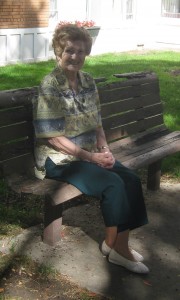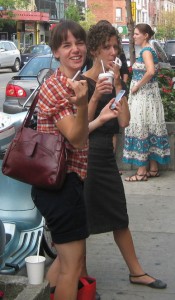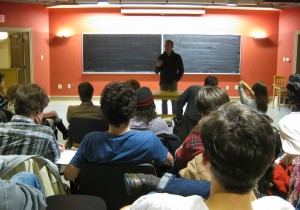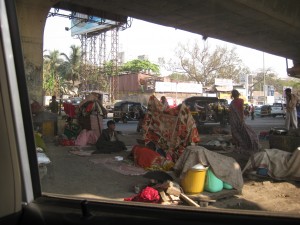 In one of my favourite passages in Plato’s Republic, Socrates says that he likes to talk with old people because “they are like men who have proceeded on a certain road that perhaps we too will have to take.” (I.328e) There are many aspects of this remark that would be worth exploring, but I am specifically interested in the image of the road, and the idea that it is only perhaps the case that we, too, will take that road. This passage, it seems to me, highlights the way that, for each of us, our own future always remains uncertain: we cannot say in advance where we are going, and we cannot know in advance what it will be like to be there. Nonetheless, as Socrates suggests, it is wise to pay heed to the experience of others who have travelled their own roads, for the insight that their experiences can offer us about our own lives. Socrates’ remark points to both the obscurity of our own future, and of the importance of trying nonetheless to acknowledge its weight.
In one of my favourite passages in Plato’s Republic, Socrates says that he likes to talk with old people because “they are like men who have proceeded on a certain road that perhaps we too will have to take.” (I.328e) There are many aspects of this remark that would be worth exploring, but I am specifically interested in the image of the road, and the idea that it is only perhaps the case that we, too, will take that road. This passage, it seems to me, highlights the way that, for each of us, our own future always remains uncertain: we cannot say in advance where we are going, and we cannot know in advance what it will be like to be there. Nonetheless, as Socrates suggests, it is wise to pay heed to the experience of others who have travelled their own roads, for the insight that their experiences can offer us about our own lives. Socrates’ remark points to both the obscurity of our own future, and of the importance of trying nonetheless to acknowledge its weight.
It seems to me that there are two difficulties we face in comprehending our own future. Let me describe each in turn.
The first difficulty is a psychological difficulty. At every moment, I am aware of myself, and I have a sense that “this is what I am like.” We seem, that is, to be confronted with our own nature, and that nature seems to be “just how it is,” “just how I am.” The shocking truth of aging, however, is that we change. Though this is how I am now, that will not always be so. As we make our way through the day, the general situation we are in seems like our permanent setting and it is very hard not to act on the presumption that things will stay the same. Surely something like this is involved in a person’s refusal to quit smoking, despite overwhelming evidence of the ill-health to which this will lead: we can know this to be true, but it doesn’t feel true. A similar perspective no doubt lies behind the very troubling ways in which people can manage their longer-term interpersonal and economic lives poorly. We can live in denial that our relationships need our care, taking them for granted as we act in ways that are ultimately destructive of them. Similarly, we can live in denial of the need to care for our economic well-being, taking for granted that the experience of “getting by” satisfactorily that we can manage at 25 or 35 will always be possible–but, of course, it won’t be. Our experience, then, plays a kind of trick on us, letting us believe that we “are” like this or that, when in fact this is only the current form our life is passing through, on the way to another form of living we have not yet anticipated. The psychological difficulty, then, rooted in the inherent inability to experience our own future, is the natural resistance we have to acknowledging that it is not the nature of our future simply to “work out” automatically: we need to take care of our future, for our future will not automatically take care of us. It is for this reason that looking to the experience of older others can be helpful: through them we can see what it is like to age, even though we cannot see that about ourselves; in seeing how they have made their way, we can see what it is like to care–well or poorly–for one’s future.
The second difficulty is a metaphysical difficulty, by which I mean a difficulty posed by reality. The difficulty reality poses to us when it comes to “owning up” to our own future is that the terms according to which our world works also change. This means that, even if we do glean insight from the lives of those who travelled these paths before us, their ways of coping with their situations might no longer apply to us. The specific circumstances I am imagining here are situations of technological, cultural, or environmental change. My mom found a way to make it through her life, as did her grandfather before her, but the world in which each of them made her or his ways presented a very different face than the world I live in. They knew nothing, for example, of the ways the internet has had an impact on the carrying out of personal relationships, of how deregulated banking has intervened in the capacities that individuals and families have for having a private home or securing a pension, or of how massive environmental exploitation has reshaped our involvement with nature. The second difficulty, then, is that we can never get a clear hold on the right frame of reference in which to assess our efforts, because the terms of the future world can radically undermine the terms we are accustomed to depend upon in our interpretations. Whereas the first difficulty in coping with the future is rooted in the psyche of the individual, and thus can be meaningfully addressed by the individual’s own efforts, this second difficulty is rooted in reality, and thus is not affected by the actions of the individual.
 The first difficulty–the psychological difficulty of acknowledging the need to take care of our old age–regularly inspires in me the desire to encourage others, especially others in their 20s and 30s, to be more attentive to the ways their current actions are building the home they will have for themselves when they are older. More exactly, I should say, it is the real short-sightedness that I think I see in the actions of these people that inspires this desire in me. It is imperative that young adults devote themselves to advanced education, develop good habits of moral and professional behaviour, and care for their own psychological and interpersonal health if they are to be able to greet middle-age and old age with a smile.
The first difficulty–the psychological difficulty of acknowledging the need to take care of our old age–regularly inspires in me the desire to encourage others, especially others in their 20s and 30s, to be more attentive to the ways their current actions are building the home they will have for themselves when they are older. More exactly, I should say, it is the real short-sightedness that I think I see in the actions of these people that inspires this desire in me. It is imperative that young adults devote themselves to advanced education, develop good habits of moral and professional behaviour, and care for their own psychological and interpersonal health if they are to be able to greet middle-age and old age with a smile.
The second difficulty–the changing terms of the modern world–inspires in me a deeper concern. Not just as individuals, but also as a culture, we look back on the way things have been, and act as if that way will continue. In fact, this seems unrealistic. Many people have made this point with respect to the destruction of the natural environment, and this is surely a compelling point. I have an even deeper concern, however, for economic, technological, and political matters. I won’t discuss the economic and political matters now, for the impact of technological changes is a big enough thought to grapple with on its own. What is my concern?
More than anything else, I am concerned about the technological transformation of the social world and the work world. As internet shopping becomes more and more dominant, the ability of families or individuals to maintain small businesses progressively declines. As people turn more and more to downloadable music for use on portable, personal devices, the capacity for individuals to earn a living by playing music progressively declines. These are two simple examples that are exemplary, I think, of a larger trend, and I want to point to two consequences of this trend.
The first consequence is that even people who have tried sincerely to care for their futures by cultivating a trade and working to build a business or a career can now find themselves in a world in which that business or career is no longer viable. Many have already encountered this problem, and I fear that this is going to be the plight of many more people in the near future.
 The second consequence is faced, not by the people who try to make a living in these ways, but by the rest of us, that is, those of us who depend on the contribution those entrepreneurs make to our world. As those small businesses dry up, we discover there is no longer a “downtown,” no longer a public, market area in which to congregate, and to participate in a world in which producers and consumers cooperate. Instead, we are left to a much more private life, where the market has been replaced by store fronts, run by wage-labourers, for the chains that dominate internet shopping. As the work for musicians dries up, we are left with only the mass-market products designed and distributed by the huge “music” corporations that are oriented to advertising and mass appeal, rather than to art. In short, we rely on the environment that supports small businesses, trades, and artists to provide us all with a social world that offers us a good quality of life, and this environment disappears at the same time that the careers of individuals disappear.
The second consequence is faced, not by the people who try to make a living in these ways, but by the rest of us, that is, those of us who depend on the contribution those entrepreneurs make to our world. As those small businesses dry up, we discover there is no longer a “downtown,” no longer a public, market area in which to congregate, and to participate in a world in which producers and consumers cooperate. Instead, we are left to a much more private life, where the market has been replaced by store fronts, run by wage-labourers, for the chains that dominate internet shopping. As the work for musicians dries up, we are left with only the mass-market products designed and distributed by the huge “music” corporations that are oriented to advertising and mass appeal, rather than to art. In short, we rely on the environment that supports small businesses, trades, and artists to provide us all with a social world that offers us a good quality of life, and this environment disappears at the same time that the careers of individuals disappear.
Both personally and culturally, I believe we all need to show a greater concern for our future. My worry is that, culturally, we rely too much on the belief that the future will resemble the past and that, as a culture, we are not sufficiently acknowledging the massive cultural changes that are in store for us. Perhaps, despite the voice of optimism that typically accompanies talk of technological “advance,” the “old people” from whom we could learn a lesson now are those cultures that have undergone massive and unexpected cultural decline.

 Before we are adults, we are children. When we are adults, we can endure the implicit snubs and put-downs, and, indeed, the implicit flattery, that our conversational companions direct at us in the power-plays that typically shape our interpersonal lives. When we are children, however, we have not yet built up the secure sense of self-identity that allows the adult to know who she is despite the images of her that are projected upon her through the speech of others. Indeed, it is precisely through such projections, such implicit portrayals of self-identity, that the child comes to form a sense of who she is in the eyes of others.
Before we are adults, we are children. When we are adults, we can endure the implicit snubs and put-downs, and, indeed, the implicit flattery, that our conversational companions direct at us in the power-plays that typically shape our interpersonal lives. When we are children, however, we have not yet built up the secure sense of self-identity that allows the adult to know who she is despite the images of her that are projected upon her through the speech of others. Indeed, it is precisely through such projections, such implicit portrayals of self-identity, that the child comes to form a sense of who she is in the eyes of others.










 Participants in these
seminars consistently have the experience of growth in their conversation and
conceptual abilities, and typically leave with a transformed sense of the nature
and possibilities of philosophy.
Participants in these
seminars consistently have the experience of growth in their conversation and
conceptual abilities, and typically leave with a transformed sense of the nature
and possibilities of philosophy.




